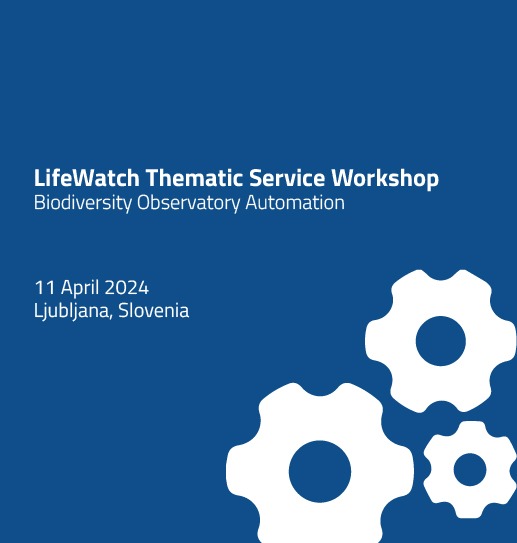Biodiversity Observatory Automation
Home | Events | LifeWatch Slovenia | Biodiversity Observatory Automation

April 11, Ljubljana, Slovenia
The Biodiversity Observatory Automation, part of our Thematic Service Workshop Series, is dedicated to reviewing and updating the requirements for effective biodiversity assessment in an era of unprecedented environmental change and biodiversity loss.
Although biodiversity assessment can be challenging due to time-consuming fieldwork and demanding post-fieldwork data processing and storage, advances in automation of data collection, increasing computational power, and artificial intelligence offer new possibilities.
The workshop, hosted by LifeWatch Slovenia, will bring together experts to present key achievements and obstacles in monitoring and observational approaches and discuss the drawbacks and needs of different stakeholders. In this workshop, we will explore the possibilities offered by a variety of modern approaches to monitoring and detecting biodiversity (from aerial observations to eDNA), from data collection design, data curation, and data exploration, including the use of AI to FARIfication of data to digital twins.
Agenda
| 9:00 – 9:10 | Greetings from Slovenian hosts – Tanja Pipan and Andreja Ramšak (LifeWatch-SI) |
| 9:10 – 9:30 | Presentation of Thematic Core Services (TCS) – Alberto Basset (LifeWatch ERIC Service Center) |
| 9:30 – 10:10 | Invited talk: Ecosystem Virtual research environment: from data FARIfication to digital twins – Zhiming Zhao (University of Amsterdam) |
| 10:10 – 10:25 | Talk: Challenges to Implement Darwin Core Meta Data Standard within GeoNetwork portals – Magdalena Năpăruş-Aljančič, Žan Kafol and Tanja Pipan (Karst Research Institute ZRC SAZU) |
| 10:25 – 10:40 | Talk: Case study: Landscape features and biodiversity in agroecosystem – Danijel Ivajnšič and Nataša Pipenbaher (University of Maribor) |
| 10:40 – 11:20 | Invited talk: Using high-throughput species discovery with robots and Nanopore sequencing to overcome taxon biases in biodiversity science – Rudolf Meier (Museum of Natural History, Berlin) |
| 11:20 – 11:30 | Coffee break |
| 11:30 – 12:10 | Invited talk: Environmental DNA and DNA metabarcoding for biodiversity monitoring and assessment – Gentile Francesco Ficetola (Università degli Studi di Milano, Department of Environmental Science and policy) |
| 12:10 – 12:25 | Talk: Use of drones for various purposes – Hubert Potočnik (University of Ljubljana) |
| 12:25 – 12:40 | Talk: Camera traps and citizen science App for biodiversity monitoring – Luka Duniš, Žiga Velkavrh and Elena Bužan (University of Primorska) |
| 12:40 – 13:00 | Debate |
| 13:00 – 14:00 | Lunch break |
| 14:00 – 14:30 | Invited talk: LIFE NarcIS – NAtuRe Conservation Information System in Slovenia – Rok Havliček (Slovenian Environment Agency) |
| 14:30 – 14:45 | Talk: Next-generation multi-modal monitoring of Rana arvalis in Slovenia – preliminary results – David Stanković, Sara Strah, Mojca Vek, Mariana Carreira Santos, Mladen Avramović and Jernej Polajnar (National Institute of Biology, University of Aveiro, University of South Bohemia) |
| 14:45 – 15:00 | Talk: Acoustic and vibrational biodiversity monitoring – Jernej Polajnar and Rok Šturm (National Institute of Biology) |
| 15:00 – 15:20 | Coffee break |
| 15:20 – 16:00 | Invited talk: Presentation of the LifeWatch Belgium observatory services – Klaas Deneudt (VLIZ) |
| 16:00 – 16:15 | Talk: Novel approaches to surveying habitat types and organisms on the seabed – Lovrenc Lipej, Borut Mavrič (National Institute of Biology, Marine Biology Station Piran) |
| 16:15 – 16:55 | Invited talk: Estimating structural diversity of forests using national remote sensing data – Anže Martin Pintar and Mitja Skudnik (Slovenian Forestry Institute) |
| 16:55 – 17:15 | Coffee break |
| 17:15 – 17:45 | Workshop, moderated debate |
| 17:45 – 18:00 | Conclusions and Wrap-up |